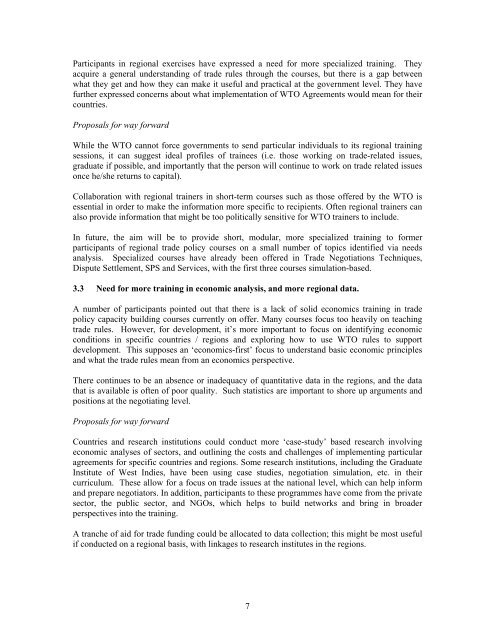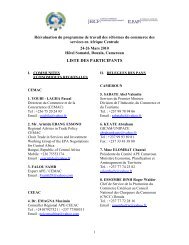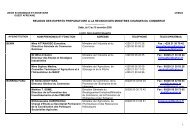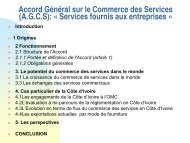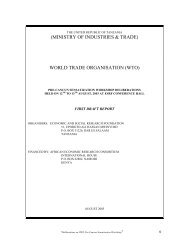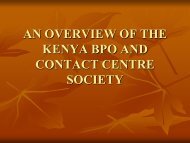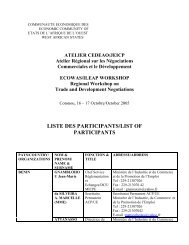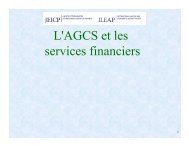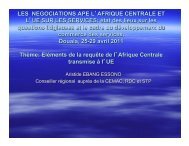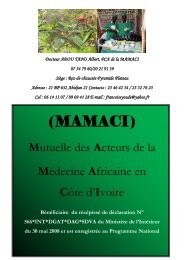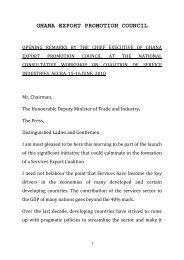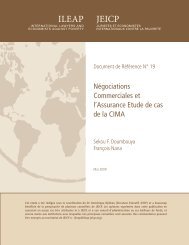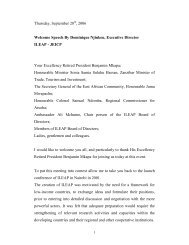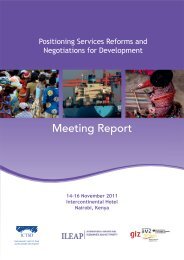for laws and legal regulations. This must be reinforced by building capacity in the public servicesuch that ministers have competent staff that understand the technical details <strong>of</strong> trade policy. Tobuild this capacity, long-term training programmes in areas such as economics and law can becomplemented with short-term courses, conferences and seminars.While training in both law and economics remains essential, there is a need to <strong>of</strong>fer lawyers andeconomists multidisciplinary training, including in policy and negotiation. This can be furtherdeveloped by acquisition <strong>of</strong> technical skills such as data analysis provided by institutions such asUNCTAD and the WTO. In addition, a recurring demand <strong>of</strong> low-income country <strong>of</strong>ficials in tradepolicy capacity building is assistance to travel to negotiations, where their staff can acquireimportant on-the-job training that can <strong>of</strong>ten be more important than training workshops.Workshops tend to be given on a sporadic basis with little follow-up or consistency on substance.This has led to a field with many generalists and not enough specialists, with the result thatgeneralist negotiators from small countries <strong>of</strong>ten find themselves negotiating with teams <strong>of</strong>highly-trained specialists from developed countries.Identified constraints in this area include: (i) difficulty <strong>of</strong> instituting multidisciplinary programs;(ii) infrastructure constraints – e.g. libraries, access to data and data sources, or even teachers; and(iii) quality <strong>of</strong> trainers- some trainers are not at an adequate level, and end up giving studentsincorrect information even when the curriculum is good.Proposals for way forwardA number <strong>of</strong> solutions to improving the effectiveness <strong>of</strong> TRTA were raised in the meeting. Theseincluded: (i) the use <strong>of</strong> tests, exams, and evaluation mechanisms to ensure retention <strong>of</strong> subjectmatter; (ii) using e-learning exercises before going to a face-to-face to ensure comprehension <strong>of</strong>background materials; (iii) partnering with international agencies to help with access to data andteachers; (iv) for short to medium-term training, programs should be run in-country; (v)attendance and entry requirements or prerequisites for short-term courses; and (vi) build capacityto enable countries to articulate their TRTA needs such that delivery can be better targeted.Institutions such as TRALAC are using various techniques to forward a development-orientedperspective. For instance, TRALAC <strong>of</strong>fers a programme combining law, economics andmanagement, which serves to develop inter-disciplinary expertise and allow trainees to use thisexpertise more effectively in trade policy making. It also <strong>of</strong>fers ‘Mixed Modality Learning’ thatincludes residential learning programmes, distance/e-learning, and anchoring <strong>of</strong> programs ininstitutional settings, which enhances buy-in from ministries/governments, since participantsremain in their work environments. In addition, assignments are made consonant with the workresponsibility <strong>of</strong> participants.3.2 WTO regional training provides example <strong>of</strong> challenges and areas for improvingdelivery.In delivery <strong>of</strong> regional training programs by the WTO, there is an ongoing challenge <strong>of</strong> ensuringthat the right people are targeted such that the training received can be maximized at the policymaking level. Since it remains up to governments to appoint trainees, there is no guarantee thatthe attendees to these courses are necessarily the right people, or even that their newly-acquiredskills will be made use <strong>of</strong> by their ministries upon completion <strong>of</strong> the training.6
Participants in regional exercises have expressed a need for more specialized training. Theyacquire a general understanding <strong>of</strong> trade rules through the courses, but there is a gap betweenwhat they get and how they can make it useful and practical at the government level. They havefurther expressed concerns about what implementation <strong>of</strong> WTO Agreements would mean for theircountries.Proposals for way forwardWhile the WTO cannot force governments to send particular individuals to its regional trainingsessions, it can suggest ideal pr<strong>of</strong>iles <strong>of</strong> trainees (i.e. those working on trade-related issues,graduate if possible, and importantly that the person will continue to work on trade related issuesonce he/she returns to capital).Collaboration with regional trainers in short-term courses such as those <strong>of</strong>fered by the WTO isessential in order to make the information more specific to recipients. Often regional trainers canalso provide information that might be too politically sensitive for WTO trainers to include.In future, the aim will be to provide short, modular, more specialized training to formerparticipants <strong>of</strong> regional trade policy courses on a small number <strong>of</strong> topics identified via needsanalysis. Specialized courses have already been <strong>of</strong>fered in Trade Negotiations Techniques,Dispute Settlement, SPS and Services, with the first three courses simulation-based.3.3 Need for more training in economic analysis, and more regional data.A number <strong>of</strong> participants pointed out that there is a lack <strong>of</strong> solid economics training in tradepolicy capacity building courses currently on <strong>of</strong>fer. Many courses focus too heavily on teachingtrade rules. However, for development, it’s more important to focus on identifying economicconditions in specific countries / regions and exploring how to use WTO rules to supportdevelopment. This supposes an ‘economics-first’ focus to understand basic economic principlesand what the trade rules mean from an economics perspective.There continues to be an absence or inadequacy <strong>of</strong> quantitative data in the regions, and the datathat is available is <strong>of</strong>ten <strong>of</strong> poor quality. Such statistics are important to shore up arguments andpositions at the negotiating level.Proposals for way forwardCountries and research institutions could conduct more ‘case-study’ based research involvingeconomic analyses <strong>of</strong> sectors, and outlining the costs and challenges <strong>of</strong> implementing particularagreements for specific countries and regions. Some research institutions, including the GraduateInstitute <strong>of</strong> West Indies, have been using case studies, negotiation simulation, etc. in theircurriculum. These allow for a focus on trade issues at the national level, which can help informand prepare negotiators. In addition, participants to these programmes have come from the privatesector, the public sector, and NGOs, which helps to build networks and bring in broaderperspectives into the training.A tranche <strong>of</strong> aid for trade funding could be allocated to data collection; this might be most usefulif conducted on a regional basis, with linkages to research institutes in the regions.7


